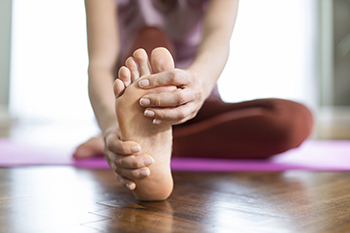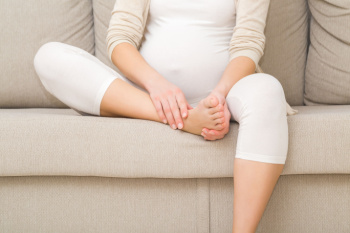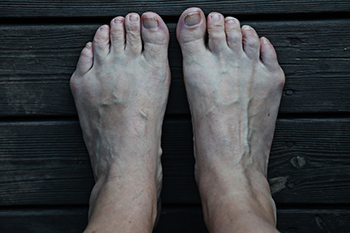
Toenails can fall off for a number of reasons, including injury, infection, or underlying health issues. Trauma, such as stubbing a toe or dropping something heavy on it, may cause blood to collect under the nail, called a subungual hematoma, which can lead to toenail loss. Fungal infections can also weaken the nail, causing it to become discolored, thickened, and brittle until it detaches from the nail bed. Skin conditions like psoriasis may damage the nail matrix and lead to nail separation. Certain health conditions, like diabetes or poor circulation from peripheral artery disease, can limit blood flow to the feet and make the nails more prone to falling off. Certain medications may affect nail growth and strength. A podiatrist can examine the affected nail and recommend proper treatment, including antifungal care, or monitoring circulation. If you have problematic toenails, it is suggested that you schedule an appointment with a podiatrist for appropriate treatment.
Toe pain can disrupt your daily activities. If you have any concerns, contact Dr. Scott Peters of Ankle & Foot Walk-In Clinic. Our doctor can provide the care you need to keep you pain-free and on your feet.
What Causes Toe Pain?
Most severe toe pain is caused due to a sports injury, trauma from dropping something heavy on the toe, or bumping into something rigid. Other problems can develop over time for various reasons.
Toe pain can be caused by one or more ailments. The most common include:
- Trauma
- Sports injury
- Wearing shoes that are too tight
- Arthritis
- Gout
- Corns and calluses
- Hammertoe
- Bunions
- Blisters
- Ingrown toenails
- Sprains
- Fractures (broken bones)
- Dislocations
When to See a Podiatrist
- Severe pain
- Persistent pain that lasts more than a week
- Signs of infection
- Continued swelling
- Pain that prevents walking
Diagnosis
In many cases the cause of toe pain is obvious, but in others, a podiatrist may want to use more advanced methods to determine the problem. These can range from simple visual inspections and sensation tests to X-rays and MRI scans. Prior medical history, family medical history, and any recent physical traumatic events will all be taken into consideration for a proper diagnosis.
Treatment
Treatments for toe pain and injuries vary and may include shoe inserts, padding, taping, medicines, injections, and in some cases, surgery. If you believe that you have broken a toe, please see a podiatrist as soon as possible.
If you have any questions please feel free to contact our office located in Mayfield Village, OH . We offer the newest diagnostic tools and technology to treat your foot and ankle needs.

Pregnancy often brings about several physical changes, and foot pain is a frequent complaint among expectant mothers. As the body gains weight and hormones relax the ligaments, increased pressure on the feet can lead to discomfort. Common issues include swelling, also known as edema, which may cause tightness and aching in the feet and ankles. Flat feet or fallen arches can develop due to the added strain, leading to pain in the heel or arch. Some women experience cramping or a burning sensation caused by changes in circulation and posture. Wearing supportive shoes, elevating the feet, and staying hydrated can help ease symptoms. Paying attention to foot health during pregnancy is important. If you are experiencing any type of foot pain during your pregnancy, it is suggested that you contact a podiatrist who can offer you effective relief and management tips.
Pregnant women with swollen feet can be treated with a variety of different methods that are readily available. For more information about other cures for swollen feet during pregnancy, consult with Dr. Scott Peters from Ankle & Foot Walk-In Clinic. Our doctor will attend to all of your foot and ankle needs.
What Foot Problems Can Arise During Pregnancy?
One problem that can occur is overpronation, which occurs when the arch of the foot flattens and tends to roll inward. This can cause pain and discomfort in your heels while you’re walking or even just standing up, trying to support your baby.
Another problem is edema, or swelling in the extremities. This often affects the feet during pregnancy but tends to occur in the later stages.
How Can I Keep My Feet Healthy During Pregnancy?
- Wearing orthotics can provide extra support for the feet and help distribute weight evenly
- Minimize the amount of time spent walking barefoot
- Wear shoes with good arch support
- Wear shoes that allow for good circulation to the feet
- Elevate feet if you experience swelling
- Massage your feet
- Get regular, light exercise, such as walking, to promote blood circulation to the feet
If you have any questions please feel free to contact our office located in Mayfield Village, OH . We offer the newest diagnostic and treatment technologies for all your foot and ankle needs.

A bunion on the pinky toe, also called a bunionette, forms when the fifth metatarsal bone begins to push outward, causing a noticeable bump at the base of the smallest toe. This condition is often linked to wearing pointy shoes that are too tight in the toe box, which forces the pinky toe inward and places repeated pressure on the outer edge of the foot. Over time, this can lead to redness, swelling, and pain. Although some people may not feel discomfort in the early stages, the deformity can become more painful as the bunionette progresses. A podiatrist can diagnose a bunionette through a physical exam and imaging, such as X-rays, to assess bone alignment. In some cases, a podiatrist may recommend shoe changes, padding, or orthotic support to reduce discomfort. When a bunionette is severe and causes persistent pain, surgery may be considered to correct the alignment of the bone. If you have a painful bunion at your pinky toe joint, it is suggested that you make an appointment with a podiatrist for an exam and treatment.
If you are suffering from bunion pain, contact Dr. Scott Peters of Ankle & Foot Walk-In Clinic. Our doctor can provide the care you need to keep you pain-free and on your feet.
What Is a Bunion?
Bunions are painful bony bumps that usually develop on the inside of the foot at the joint of the big toe. As the deformity increases over time, it may become painful to walk and wear shoes. Women are more likely to exacerbate existing bunions since they often wear tight, narrow shoes that shift their toes together. Bunion pain can be relieved by wearing wider shoes with enough room for the toes.
Causes
- Genetics – some people inherit feet that are more prone to bunion development
- Inflammatory Conditions - rheumatoid arthritis and polio may cause bunion development
Symptoms
- Redness and inflammation
- Pain and tenderness
- Callus or corns on the bump
- Restricted motion in the big toe
In order to diagnose your bunion, your podiatrist may ask about your medical history, symptoms, and general health. Your doctor might also order an x-ray to take a closer look at your feet. Nonsurgical treatment options include orthotics, padding, icing, changes in footwear, and medication. If nonsurgical treatments don’t alleviate your bunion pain, surgery may be necessary.
If you have any questions, please feel free to contact our office located in Mayfield Village, OH . We offer the newest diagnostic and treatment technologies for all your foot care needs.

